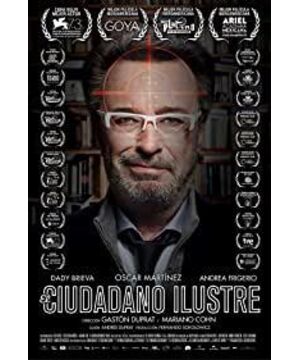Searching for a film about a writer and came across "Outstanding Citizen". Think Bernhard or Manéa, similar ruthless criticism.
2
Novelist Daniel can express his true thoughts at the Nobel Prize ceremony, including his true feelings about the boredom of more than 40 years of life in Europe in his later hometown, the small town of Salas, which can be expressed in his novels written in Europe. My complicated feelings about my hometown (it seems to be mostly criticism), but for people who always live in a small town, it seems that they are doomed to be inseparable from the small town, as Daniel, who leaves the small town means that he will never go back , what the small town needs is not simple and pure truth, but the "illusion" of complex entanglements, which Daniel thinks is "ignorance and ignorance", but for small towns, they return violence or indifference, and small town life is a In the past, people seem to be wandering between recklessness and silence or indifference, of course not to say that there is no warmth, but the overall atmosphere seems rough and depressed, then rude and debauched.
3
The Romanian writer Manea left his hometown to live in New York for many years, and then returned to his hometown again, leaving behind "The Return of the Rogue". Those real homecoming experiences are unforgettable on the one hand, and hopeless on the other. Seemingly hopeless, the experience he wrote down in a black notebook ended up on the flight back to New York, like a last goodbye to his hometown—as Daniel wrote at last In his new novel, Distinguished Citizen, he reads: "I think the most commendable thing I've ever done in my life is to escape that place. My protagonists, they can never leave, and neither can I. Go back." Returning to his hometown, for Daniel, who has been in Europe for 40 years, is always full of temptation in his imagination, just as Manea repeatedly asked whether he should accept the invitation to return in his conversation with Saul Bellow. A hometown. The hometown constitutes a long-term temptation because of the distance, but unfortunately, the hometown does not live in the imagination, not in the temptation. The hometown lives in a specific place and experiences the erosion of the same time. The imagination of Daniel, the honor of the Nobel Prize, is also meaningless to the real daily life of the people in the small town of Sals. fiction must be reduced to the anxiety of existence itself.
4
His hometown once had an attraction for Daniel in the distance of time and space, but after disappearing such a distance, he really stepped on the land of his hometown, and everything was business as usual, just as he felt when he was young, maybe like What he later told a fellow countryman who insisted on inviting him to his house for dinner was that they just happened to live in the same town, and they didn't actually know each other, and they had no desire to understand each other's true feelings. The desires of people in the town seem to be only survival, or they are suppressed to the point where only survival is left. The desire to understand each other’s hearts and interpret each other’s feelings disappears day after day in the daily indifference or silence. People cannot treat each other with sincerity. They cheat around survival, cheat around power, and of course cheat around art. In the eyes of the other party, it is not a real person who has the same emotions and desires as himself, but a person who has "alienated" into various names, honors, and powers. Through the halo of these "identities" To perceive each other, there is no intention to communicate, but in the end, I feel that the heart itself is dull and numb, and in the end, I don't realize it, and everything is safe.
5
Whether it is in the eyes of the mayor who greeted Daniel or in the eyes of his elementary school classmate Antonio, Daniel is not that Daniel. In the eyes of the mayor, he is a representative of the town's honor. In Antonio's eyes, he wants to A comparison object who has proved that he is not bad, in the eyes of a father who asked $10,000 to buy a new wheelchair for his son in a wheelchair, Daniel means a person with a lot of money... …Daniel is not himself, but the projection object of the various survival desires of the people in the town. Of course, Daniel hopes to be like others, not to become a statue because of this award, but in the small town, people seem to be more accustomed to it. Look at him in a practical and existential light, even if it is a fictional story in his novels, people have to dismantle him into moral and ethical things to understand him, rather than trying to understand the people in the story, as they understand themselves To understand—perhaps their understanding of themselves occurs in the framework of morality, or in the practicality of existence.
6
Perhaps it was the 40-year time-space distance from his hometown that gave Daniel the illusion of returning, but he still felt that the time-space distance was almost disappearing during the week or so he was in the small town, all ignorant and ignorant, without any illusions, The truth makes him want to change but is powerless, this feeling is very strong. But the people in the town understood this feeling as a betrayal of their hometown and a violation of the unquestioned morals and ethics. They didn't plan to understand Daniel any further, just as they didn't seem to plan to understand themselves any further. .
7
Another explanation is that Daniel’s 40 years of writing adhered to the writing creed of “an artist must dare to question and doubt”, and the recognition of the Nobel Prize made him feel “questioning and doubting about this creed itself. ", the tone of his writing-"dare to question and doubt", seems to have been lost in the recognition of the Nobel Prize, which is undoubtedly devastating to his writing. So for five years, I looked like running, refusing activities, watching the dead "swan"(?) by the lake, which is very reminiscent of the death of his writing itself - but he wrote Throughout his life, he has done nothing but writing, and the death of writing is equivalent to announcing the end of his life. So, he accepted the invitation of his hometown and went back for 4 days. In just 4 days, he truly felt the denial of the small town life. People were still expressing their "ignorance and ignorance". It is the position of "questioning and doubting" he has upheld when he wrote about life in the small town for 40 years. This position has been genuinely denied in the small town, and no one has "recognized" his writing position from the bottom of his heart, but young His girlfriend at the time did not understand his writing-it was in this true denial that Daniel rediscovered his writing creed of "dare to question and doubt", which has never been adopted by the small town. The people's approval, and any disapproval, is showing the existence and value of Daniel's writing art. In this way, Daniel regained his writing tone, and continued in a real opposition of "dare to question and doubt".
In fact, even if the Nobel Prize is commended, how many people really recognize it? At the award ceremony, the applause was sparse, and then some people rallied, and others looked around and rallied. Between them and Daniel, it is also a matter of face, separation, and indifference. They are only commended out of etiquette, not from sincerity - this is just more "civilized" than the people in the small town, The real feelings of the people in the small town are direct, and sometimes people can't get off the stage. Daniel came off the stage of the Nobel Prize very civilly. He may think that so many people represented by the Nobel Prize, including the audience, have accepted and recognized him, but in fact, they are just people in a civilized town, It is this layer of civilization that makes Daniel's position of "dare to question and doubt" appear to be fighting against the "Array of Nothingness", losing the real feedback and thus the power of real writing.
Five years later, in the true and true feedback from the town, Daniel, as the author, has regained the true tone of his writing. It is confronted by the true and true, and it has its own existence because of this. sense, existence value.
As a result, he is no longer afraid of any limelight, no longer afraid of attending any events, because he has found the core of his own existence and the true and true tone of his writing.
View more about The Distinguished Citizen reviews









